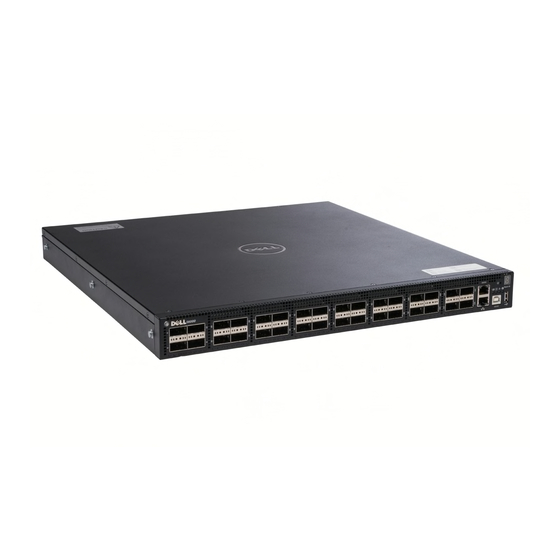- ページ 15
スイッチ Dell S4048-ONのPDF トラブルシューティングマニュアルをオンラインで閲覧またはダウンロードできます。Dell S4048-ON 29 ページ。 Enterprise switches
Dell S4048-ON にも: 設定マニュアル (19 ページ), 設定マニュアル (30 ページ)

The memory configuration file consists of lines that describe a region of memory and the tests performed on that memory region.
Therefore, you can have multiple entries for a region of memory. All parameters are separated by a : character. The following describes the
configuration file parameters.
Parameter
Description
Region Name:
The region name referred to in all output.
Start Address:
The starting address for the region of memory in hexadecimal format (without the preceding 0x). If the operating
software is defining how to manage memory, this is dynamic and you can use "-" for the start address and the
memory uses malloc'd from the available system memory.
Size:
The size of the contiguous memory area (in bytes) in hexadecimal (without the preceding 0x). If memory is
dynamic, use "-" for size and the tests use the maximum system memory.
Access:
The letter that describes how this memory is accessed:
b — byte (8 bits)
h — halfword (16 bits)
w — word (32 bits)
d — double-word (64 bits)
Increment:
How many bytes to increment to the next cell.
ECC:
Describes if ECC is supported — 0 or 1.
Chunk:
Describes how many kilo bytes (1024 bytes) are tested in one chunk. Tests multiple chunks across the memory
region.
Max Cache:
The maximum cache size for this memory.
Cacheline:
The size of a cacheline.
Iterations:
The number of times to perform the tests.
Test:
The collection of bits that tell which test to perform on this region. The tests are performed in bit order. Some tests
may not be performed due to time limitations and the purpose of the test (for example, dim cache memory test
which is time consuming and destructive to data). To run an excluded test, you must specifically request the test.
For example, to run all tests including the dim cache memory test, which is a 0x800, set the tests to fff.
A-1 — run all available tests.
Descriptive Device:
The descriptive device (for example, SPD in the case of a dimm), is described in one comma-separated field of four
parameters: address, type, start, and bytes.
Device Path:
The path to the device driver (for example, /dev/i2c-0 for a PD on the i2c bus 0).
Address of Memory
Describes the memory organization (for example, dimm memory which has an SPD device) and the address of the
Description device
device. For i2c devices, the address is presented in 7–bit hexadecimal format.
(SPD):
Type:
SPD
Range of bytes in
These two fields list the start and end registers to read descriptive entries for the device.
the Description
Device:
Example of the memtool Output
Syntax: ./memtool <option>
test [[all]|list|region#] := test using the MEM test config file
-h := show this help
info
:= display configuration info of device
ONIE diagnostics
15
